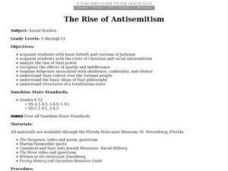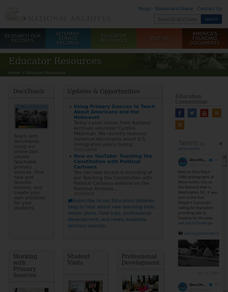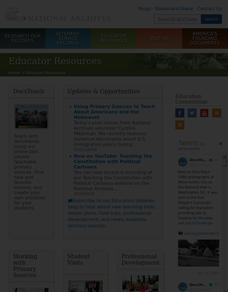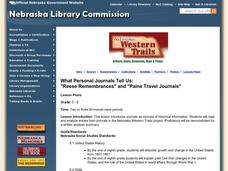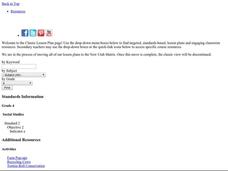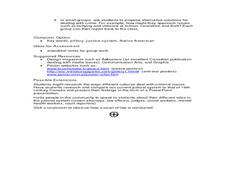Curated OER
Coming to Terms with the Past
Students explore Holocaust survivor Simon Wiesenthal. They conduct research to examine how the post-Holocaust period has been handled historically and hold a teach-in to promote continued awareness of the Holocaust's impact.
Foreign Policy Research Institute
Understanding the Koreas
Though this resource was designed in 2005, US tension with North Korea remains a relevant topic for exploration and understanding. Unfortunately, this lecture and reading-based lesson is unlikely to engage the class. The end product is a...
Canadian War Museum
Comparing Primary and Secondary Sources
This simple two-day lesson plan introduces learners to the differences between primary and secondary sources. The lesson plan includes group work that explores the similarities and differences, and the advantages and disadvantages...
Curated OER
American Veterans: Past and Present
Research groups present an audio report on modern veteran issues in a radio show format.
Curated OER
Sentence Completion 20: High-Intermediate Level
Here's an exercise that will help learners develop their vocabulary. The eight sentence completion problems are followed by an answer key that explains why one answer is correct and why the other possibilities are not. Richly detailed,...
Curated OER
Requiem The Song of the Murdered Jewish People
Students read poem The Song of the Murdered Jewish People, listen to Requiem based on poem, work on reading poem as music plays, discuss reasons for composer's musical choices, and investigate possibilities of performing a reading for an...
Curated OER
Sow the Seeds of Victory!
Pupils use the National Archives and Records Administration's records to research the history of the U.S. Food Administation.
Curated OER
Battle of the Bulge
Students identify the date and location of the Battle of the Bulge and the sides battling in it and who the military leaders were. They identify what each side did in the battle, who the victor was, and the condition each side was in...
Curated OER
African American Homesteaders
Pupils analyze the reasons African-Americans settled in the area to be known as Nebraska. Using primary source documents, they read about the challenges they faced and compare their growth and distribution of African-Americas in the...
Curated OER
Telegram from Senator Joseph McCarthy to President Harry S. Truman
Students research Senator Joseph McCarthy's February 9, 1950 speech, given at Wheeling, West Virginia, in which he claimed more than 200 State Department employees were members of the Communist Party.
Curated OER
What Personal Journals Tell Us
Students read primary source journals from the Nebraska Western Trails Project. They work in groups to analyze the journal entries and complete a worksheet. Students then write an individual essay on the experience and consider what kind...
Curated OER
The Many Faces of Chimney Rock
Students will compare and contrast images of Chimney Rock that are part of the Nebraska Western Trails project. They view postcards, pictures, photos and paintings of Chimney Rock and then observe and chart the differences and similarities.
Curated OER
Making a Brand for Ourselves the "Cowboy" Way
Fourth graders research the history of Utah. Students explore westward expansion and the importance of ranching in Utah's history. Students also investigate cattle drives in Utah.
Curated OER
Tolerance and Genocide
Students investigate the causes of genocide. For this cultural diversity lesson, students discuss genocide incidents in Africa, the Middle East, and Eastern Europe. Students then write essays about what they would do if their cultural...
Curated OER
Feudalism
Young scholars have tournaments in teams after learning information about The Middle Ages. In this Middle Ages lesson plan, students learn that tournaments are mock battles, but that they will have these battles by answering questions in...
Curated OER
Introduction to Selected Documents from the Roxcy Bolton Collection
Students listen to a guided imagery exercise that takes them back to 1969. They brianstorm ideas to try to discover why they would not be allowed to sit at an empty table at a Burdines lunch counter in 1969.
They read letters about the...
Curated OER
Marbled Butterfly
Students construct butterflies from friendly plastic for a Holocaust Museum in Houston. In this visual art lesson, students honor children of the Holocaust by making butterflies.
Curated OER
Preposition of Time
In this grammar activity, learners choose the appropriate preposition of time to fill in twenty-four blanks that make each sentence grammatically correct.
Curated OER
Edgar Allan Poe: an Author Unit
Eighth graders study the life and writing of Edgar Allan Poe in this unit of work.
Curated OER
Art as Social Commentary
Students view artworks that make a statement about social conditions. They discuss the artworks, write about them and present their ideas to the class. They create socially conscious art pieces of their own.
Curated OER
Introduction to the Graphic Novel Maus
Young scholars begin reading the graphic novel "Maus". Using the Internet, they discover fundamental differences between Judaism and Christianity. Using excerpts from the novel, they identify animal metaphors used for nationalities and...
Curated OER
Ancient Greece: Athens as a City State
Sixth graders find Greece on the map and recognize how the geography of Greece was important in its development. In this ancient Greece lesson plan, 6th graders research Greece and compare to the civilization of ancient Egypt. Students...
Curated OER
The Rise of the City States in Greece
Sixth graders examine Ancient Greece and its development of democracy. In this Greek History activity, 6th graders explore the rise of city-states in Greece and its overall effect on the development of democracy. The class continues with...
Facing History and Ourselves
What Aspects of Our Identities Do We Show to Others?
Sixth graders consider how they present their personal identities. In this character education lesson plan, 6th graders define themselves as they create masks that represent their personalities. Students share their masks and discuss...





